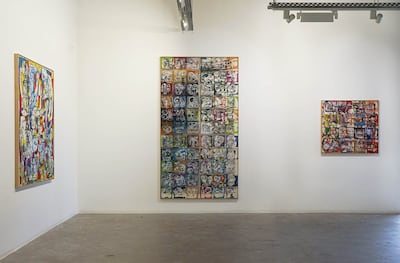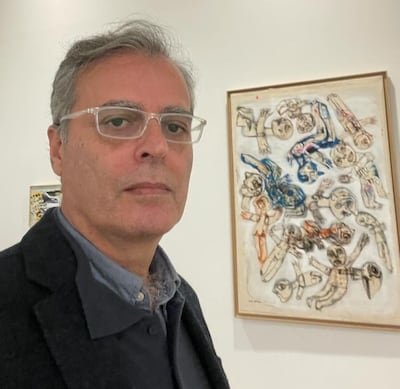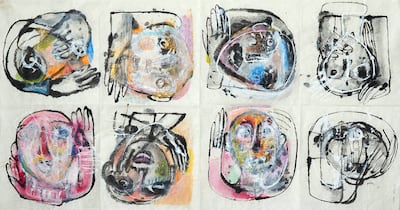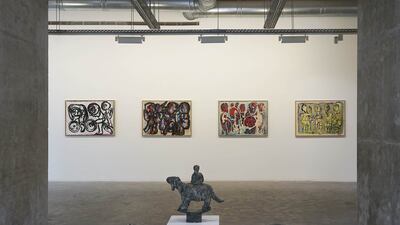The pain of Syrian existence is reflected in artist Fadi Yazigi’s latest exhibition, No Title, at the Galerie Tanit in Beirut.
The exhibition embodies an unconscious reflection of his life in the Levant, his experiences marred by loss, pain and upheaval.
Yazigi said he called the exhibition No Title simply because he no longer has the words to express the feeling of loss for his homeland and the region.
He is widely considered one of the last influential contemporary artists left in Syria, the rest having left the country in the wake of the civil war that began in 2011 and has since torn the nation apart.
Yet Yazigi said he feels a sense of loss, despite still residing in his country and working out of his studio in Damascus. Since 2011, Syria has changed, neighbouring Lebanon has all but collapsed, the wider Middle East has shifted, and Yazigi's friends – many of them Syrian cultural figures – have emigrated or died.
He says there is “no value” in talking now or voicing his opinion over what has happened in the region over the past decade.
“There is nothing to tell. What has been happening in the last 10 or 11 years in Syria, Lebanon, in Palestine … For me, now, justice is a big lie. There is no justice on this Earth,” he said, adding that Israel's brutal war in Gaza was the latest acute reminder of his belief.
“There is no justice with the big countries. They use us like toys.”

Yazigi's art is housed in numerous public collections including the British Museum and the Delfina Foundation in London, the Arab World Institute in Paris and the Atassi Foundation in Dubai – as well as private collections throughout the Middle East, Europe, Asia and the US.
His current exhibition is being shown in Beirut's Mar Mikhael district at the Galerie Tanit, which began on January 10 and runs until February 16.
The complexity of his feelings is echoed in his paintings: an unconscious, stream-of-thought abstract documentation of daily life in Syria as he navigates the country’s emergence from war and the endless stream of bad news in the region.
Chaotic colours underlie controlled lines. The subjects rendered by the artist resemble ancient Mesopotamian sculptures, anchoring his contemporary style in the region.
“As you see, it's colourful,” he said, adding that people typically associate colour with happiness. “No, it is not really like this. [The colour] is very painful, it conveys my suffering over what is going on around here.”

In one installation, Yazigi has torn apart a free daily planner given to him by the Lebanese Bank Audi after more than $200,000 of his life savings became trapped in the bank when the country’s economy collapsed overnight in 2019.
The economic crisis, blamed on decades of financial mismanagement and corruption by the Lebanese elite, caused banks to impose informal capital controls that locked depositors out of their savings.
It was disastrous for the Lebanese people – but also for thousands of Syrians who kept their savings in the Lebanese banking system. It was where Yazigi kept most of his money to pay for his children’s university education.
Scrawled on the pages of the Bank’s agenda are the words "haircut" and "headcut", an economic reference to the deeply unfavourable limits that depositors have on withdrawing their own money.
On other pages, the message differed.
“Lexotan is an anti-anxiety medication, in small quantities its effects are big,” he wrote on one page, next to a miniature painting of an almost cuneiform-like figure caressing a disembodied head. A bronze statue of another disembodied head overlays the figure’s body.
On the same page: “I was born on February 2, 2003. My mum was in Al Tabiyat hospital. It was a difficult birth. My mum slept for two days after that and left me without food. After 20 years, on February 6 the earthquake happened on my birthday.”
In another section of the exhibition, the various paintings depicting the figures Yazigi is known for painting appear to interact with each other despite being on different canvasses. Always smiling, the society of painted figures interact with the very same colours and lines they are made out of.
Yazigi's self-reflection transcends theme or identity: his paintings reproduce his state of being, but the viewer's relationship to the painting is not dictated by his personal experience or interpretation.

A self-described “workaholic”, Yazigi is in the studio every day. It is only with hindsight that he begins to process everything his paintings embodied at the time of creation.
“The most important thing for me is to give a title for my next exhibition,” he told The National.
To do that, his painted figures, a reflection of himself and society around him, must find their purpose.
Years of war and upheaval have destroyed Syria and its periphery, once a pre-eminent hub of Arab art and literature, drawing from thousands of years of culture. Now, the Levant – or Bilad Al Sham, "the nations of Syria", as the region is commonly referred to in Arabic – must find itself again. So, too, must Yazigi's painted figurines and sculptures.
“They are foetuses,” he explained. “They need to grow, to feed themselves. To find their rules, to find their culture, to read, to find the meaning of life, to find their freedom.”
Fadi Yazigi's exhibition No Title is being shown at Beirut's Galerie Tanit until February 16

